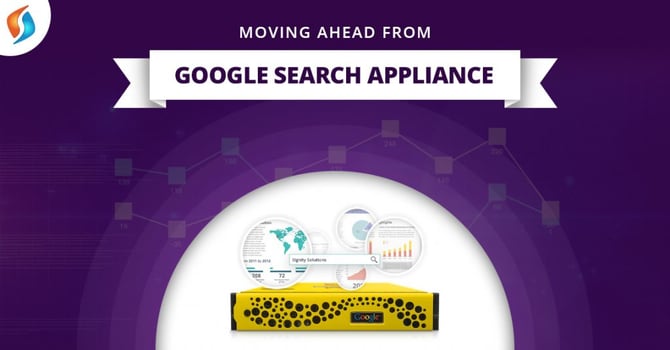
Introduction of Google Search Appliance (GSA) in 2002 was instrumental in changing the way organizations found information online. Ever since, GSA has been powering results for websites, intranet, and extranet. But with time, expectations of users for a better search experience are changing. As such, the end of appliance-based search technology was imminent.
The announcement about the discontinuation of GSA took place in 2016. Google made clear that there is no scope for search appliances in its future vision. Existing GSA customers had three years to find an alternative. Now that period is almost up, and GSA will shut down at the end of the year. Though support will be available throughout 2019, doing nothing is not an option now. It is essential for organizations to have a new search plan in place.
To stay with Google or not.
To be in the Google ecosystem, it has always been beneficial. It allows natural movement from one application to another at the corporate level. One of its newest service, Google Cloud Platform, offers migration support. Indications have come from Google that there will be support for enterprise search implementation. But it is still not clear what type of service can be available. It will be clear only after GSA makes way for Google Cloud Platform.
There are enterprises which are dependent on Google services. For them staying with Google might be the best option. It will ensure a smooth migration to Google Cloud Platform.
Then some enterprises do not want to rely too on Google. They can take advantage of this opportunity and look for other managed search services.
How to identify the new search technology?
Google has always been a preferable choice for enterprises. This has been due to its reputation and performance in the field of search. There are other viable search options also available. Some of the most popular alternatives are IBM Watson, Amazon Cloud Search, and Microsoft Azure Search.
It is essential to identify the option that meets the requirements of enterprise completely. Only then a decision about migration will be right. Various parameters that need consideration are: -
1. A complete assessment of search appliance needs is essential.
2. Enterprises need to find out the type of search infrastructure.
3. It is essential to determine the hosting method desirable.
4. Identification of required features and need of connector.
5. An assessment of the available search technologies is essential.
6. All desirable parameters need comparison with available managed search service providers.
Identification of top migration targets is possible only after a thorough analysis only.
How to plan the road ahead?
Has your company been too reliant on GSA for critical applications? Then you need to be careful while deciding migration. Any failure while transitioning the applications might lead to the collapse of search features. Though this might only cause short-term problems, it will affect the operations. Only after a complete assessment and corrective steps, would the work be back on track. Attempts to migrate without the guidance of managed search solutions providers can cause complications. Following steps need careful consideration before migrating from GSA to another alternative.
Proper Configuration:
Setting up new search environment is essential for a successful migration. New search application needs configuration to replicate the features of GSA. It might need new search features to offer the best enterprise search solutions. This process might seem time-consuming but has certain benefits as well.
There is also an opportunity in this process. That is to identify which exact search features are most important and which are not. There is also the potential of identifying new search features — ones who were not available with GSA. This opportunity is beneficial for the company in long-run — the need for proper planning and configuration to avoid any issues at the time of migration. Migration is instead an upgradation opportunity as well.
Limited Support from Google:
What comes as a surprise is lack of support from Google. Ever since the announcement of the imminent ending GSA, there have been few guidelines coming from Google. Both search technologies need checking, GSA and the migration option. Due to the lack of information from Google, it will be ideal to avail services of enterprise search implementation providers. Otherwise one might be encountering a lot of problems.
Timing:
Though GSA will be ending its run by 2019, the time to migrate for companies might be shorter. Companies need to check their GSA license. Often, they would be expiring before 2019. There will be no renewals for GSA, so they need to plan the migration sooner. This expedited transition might create a few problems itself, especially while data mapping and the creation of new features are going on. It is a must for companies to check the date of GSA agreement and plan the move according to that.
The announcement from Google has left companies wondering about their future search applications. The lack of support from Google is also confusing. It thus requires careful planning to identify the ideal search destination.
If you are also looking to migrate from GSA to other alternatives, your search ends with us. At Signity, we offer managed migration services to move from GSA to other providers. Our team members are expert in providing web search technologies solutions for enterprises. Get in touch with us and hire our outsourcing team today. Our experts can help you identify the best solution according to your requirements. Feel free to get in touch if you have any queries or questions. Contact us now.



.png?width=344&height=101&name=Mask%20group%20(5).png)














